Key takeaways:
- Reparations politics involves addressing historical injustices through both financial compensation and symbolic recognition, focusing on healing societal wounds and envisioning a more equitable future.
- Global forums facilitate meaningful dialogue around reparations, allowing diverse perspectives and collaborative strategies to emerge, transforming reparations from a moral issue to a strategic investment in communities.
- Coalition building and storytelling are vital strategies for advocating reparations, emphasizing the importance of personal narratives and cross-cultural collaborations in amplifying marginalized voices.
- Incorporating technology and engaging younger generations is crucial for the future of reparations advocacy, highlighting the need for international dialogue and shared narratives to foster a more inclusive movement.

Understanding reparations politics
Reparations politics is a complex and often contentious issue that revolves around the need to address historical injustices through compensation or restitution. I remember attending a workshop where a participant shared their family’s story of loss and displacement, highlighting how the past continues to shape their present. This powerful narrative made me realize that understanding reparations isn’t just about financial compensation; it’s about acknowledging pain and injustice that span generations.
At times, I find myself wondering: how do we even begin to quantify suffering? The conversation often shifts to whether monetary reparations can truly heal deep-rooted societal wounds. From my perspective, while some believe that financial payments alone could suffice, they often overlook the importance of symbolic recognition and the need for systemic change that addresses underlying inequalities.
As I delve deeper into this topic, I’ve seen advocates calling for reparations not just as a financial matter but as a moral imperative to restore dignity. For instance, engaging discussions in global forums frequently highlight reparations as a pathway to reconciliation, helping societies come to terms with their past. It becomes clear that reparations politics is not simply about rectifying historical wrongs; it’s also about envisioning a more equitable future where all voices matter.
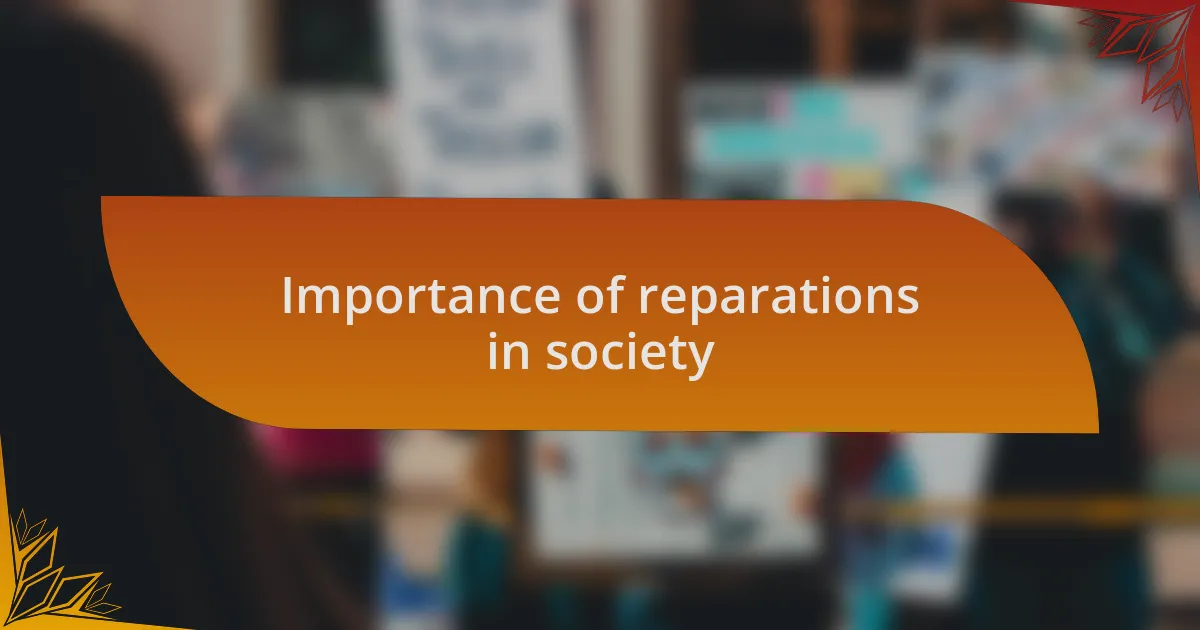
Importance of reparations in society
The importance of reparations in society cannot be overstated. When I reflect on instances of injustice, I recall a conversation with an elder in my community who described how an entire generation was denied access to education and opportunity due to systemic discrimination. This deeply resonated with me, making clear that reparations are not just about financial restitution; they symbolize acknowledgment and commitment to righting past wrongs.
I often think about how reparations can act as a bridge between communities. In discussions around this topic, I’ve seen how reparations can promote healing, fostering dialogue instead of division. For instance, a local initiative to recognize historical injustices not only opened the floor for conversations about the past but also laid the groundwork for collaborative projects aimed at mutual benefit today. Isn’t it fascinating how reckoning with our history can pave new paths toward unity?
Moreover, the societal impact of reparations reaches beyond individual stories; it resonates on a collective level. I remember sitting in a panel where various voices presented the idea of reparations as a way to empower marginalized communities. This approach shifts the narrative from viewing reparations merely as a payment to seeing them as an investment in a fairer future. If we truly want to foster inclusive societies, acknowledging the past through reparations could be an essential step.
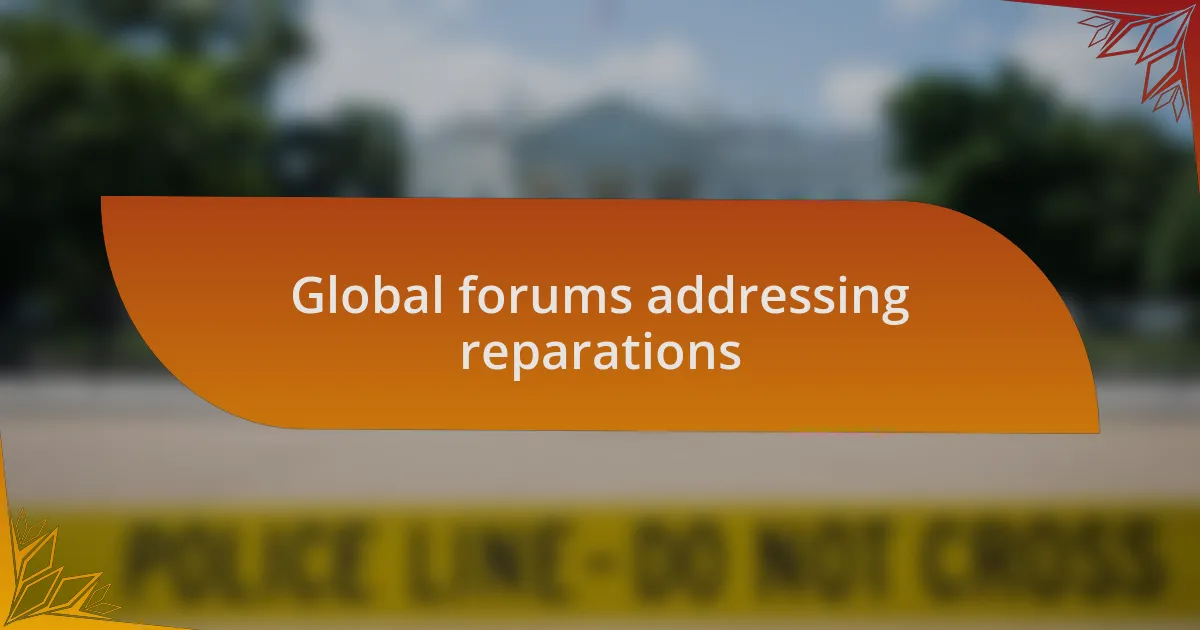
Global forums addressing reparations
Global forums dedicated to addressing reparations have become essential venues for meaningful dialogue. I vividly recall attending an international conference where experts and activists from various backgrounds passionately debated the nuances of reparations. The energy in the room was palpable, as individuals shared their personal stories, reminding everyone present that these discussions are deeply personal and vital for healing.
In these global settings, I have observed that policymakers often grapple with a complex web of historical injustices and current societal structures. During one session, a renowned economist presented data on how reparations could transform economies rather than merely serve as compensation. It made me wonder, can we view reparations not just as a moral obligation but also as a strategic investment in our collective futures?
The beauty of global forums lies in their ability to unite diverse perspectives, allowing for collaborative solutions. I once witnessed a panel discussion where representatives from countries with different histories of colonization shared their approaches to reparations. Their differing strategies ignited spirited exchanges. How can we, as a global community, learn from each other’s experiences to craft more effective paths toward justice? This question lingered in my mind, highlighting the potential for reparative actions to evolve through shared dialogue.
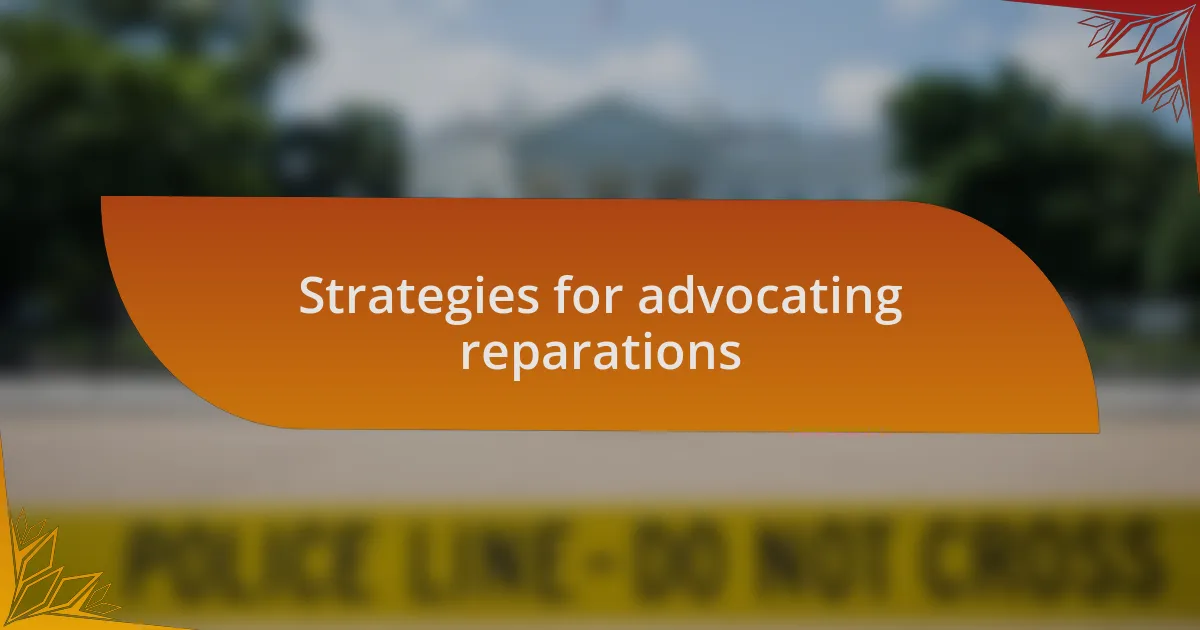
Strategies for advocating reparations
One effective strategy for advocating reparations is forming coalitions that cross national and cultural boundaries. I recall participating in a joint initiative between activists from South Africa and indigenous groups in Canada. It was incredible to see how each history of injustice informed the other, creating a more robust platform for advocacy. How might our voices resonate louder together than separately?
Utilizing storytelling is another powerful strategy. In one workshop, I witnessed how sharing personal narratives not only engaged listeners but also humanized the debate around reparations. When individuals from marginalized communities share their experiences, they invite empathy and challenge the audience to understand the stakes involved. What better way to advocate than to put a face to the policies at play?
Finally, leveraging technology can amplify our advocacy efforts. I remember when a digital campaign went viral, capturing the hearts and minds of an audience beyond traditional forum settings. Social media posts, videos, and podcasts can draw attention to reparations on a global stage. Could a single tweet or post really propel the issue into mainstream discourse? Absolutely, and it’s happening more often than we think.
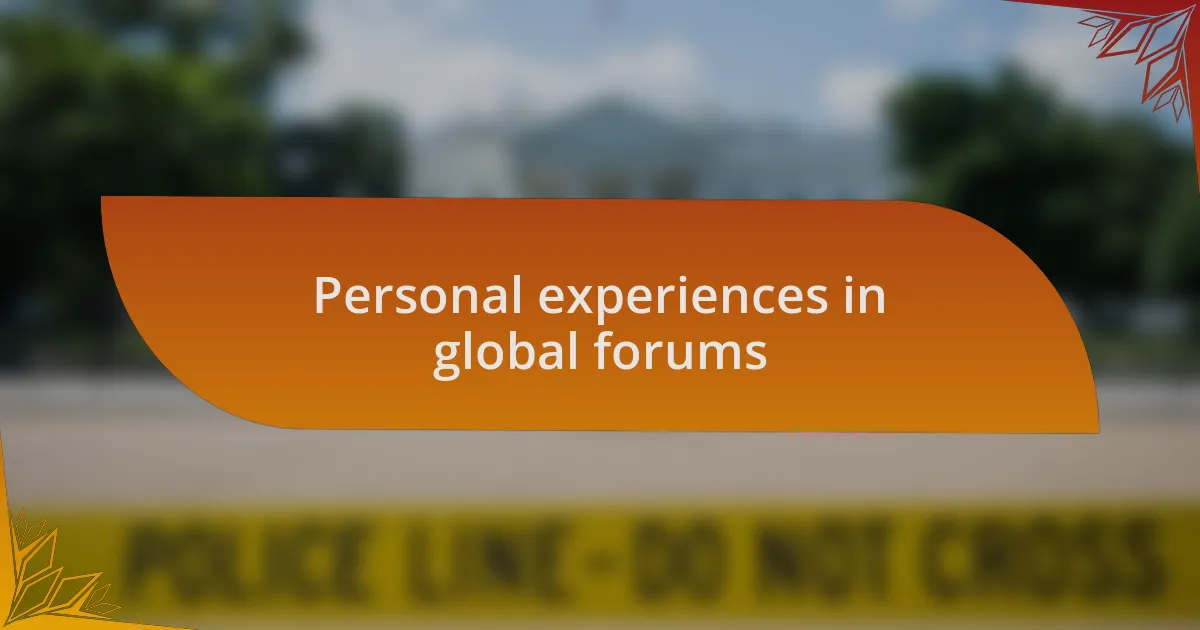
Personal experiences in global forums
Participating in global forums provided me with firsthand experiences that reshaped my understanding of reparations. At one conference in Europe, I found myself in a heated discussion surrounded by representatives from various nations. Their passionate perspectives highlighted how deeply personal and complex the conversations about reparations can be. How can you truly grasp the essence of reparations without hearing the voices that have been silenced for so long?
I vividly remember a moment during a panel discussion where a speaker shared their family’s story of displacement and loss. It was stark and emotional, creating a collective silence in the room. This moment brought to life the abstract concepts we often discuss, making me realize the urgency behind our advocacy. Isn’t it astonishing how one story can shift an entire conversation?
Engaging with activists from different backgrounds has been eye-opening as well. I recall a roundtable where we deliberated on different reparative frameworks. The diversity of thought widened my perspective and reminded me that the path to justice isn’t linear; it requires understanding the nuances of each history. How can we create effective solutions without recognizing the tapestry of experiences that inform them?
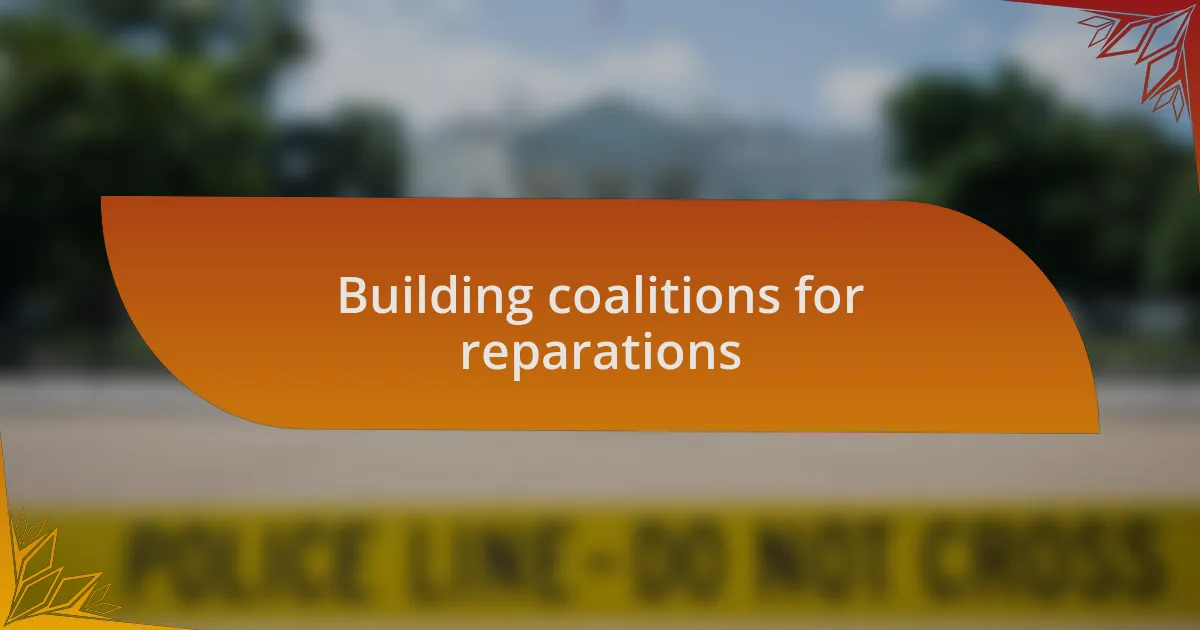
Building coalitions for reparations
Building coalitions for reparations is essential in amplifying voices that have often been marginalized. I recall a workshop where activists from diverse communities came together to draft a joint statement advocating for reparative justice. The energy in the room was electric—we each brought unique lenses to the issue, and the blending of our ideas was a reminder that collaboration enhances our advocacy. How powerful can we be when we unite our efforts for a common cause?
While attending a global summit, I had the opportunity to connect with an organization focused on indigenous rights. Their struggle for reparations mirrored the challenges faced by many oppressed groups. Listening to their leaders articulate their experiences made me realize that building coalitions isn’t just about numbers; it’s about fostering genuine relationships and shared understanding. Are we not stronger when we stand together, advocating for each other’s rights as fervently as our own?
In my experience, the journey of coalition building often leads to personal transformations as well. I remember stepping into a meeting with preconceived notions about reparations and leaving with a deeper appreciation for intersectionality—the interconnected nature of social categorizations. It struck me that our coalition must celebrate our differences while focusing on our shared goal of justice. How can we truly address the damages of the past without embracing the full spectrum of narratives present in our fight?
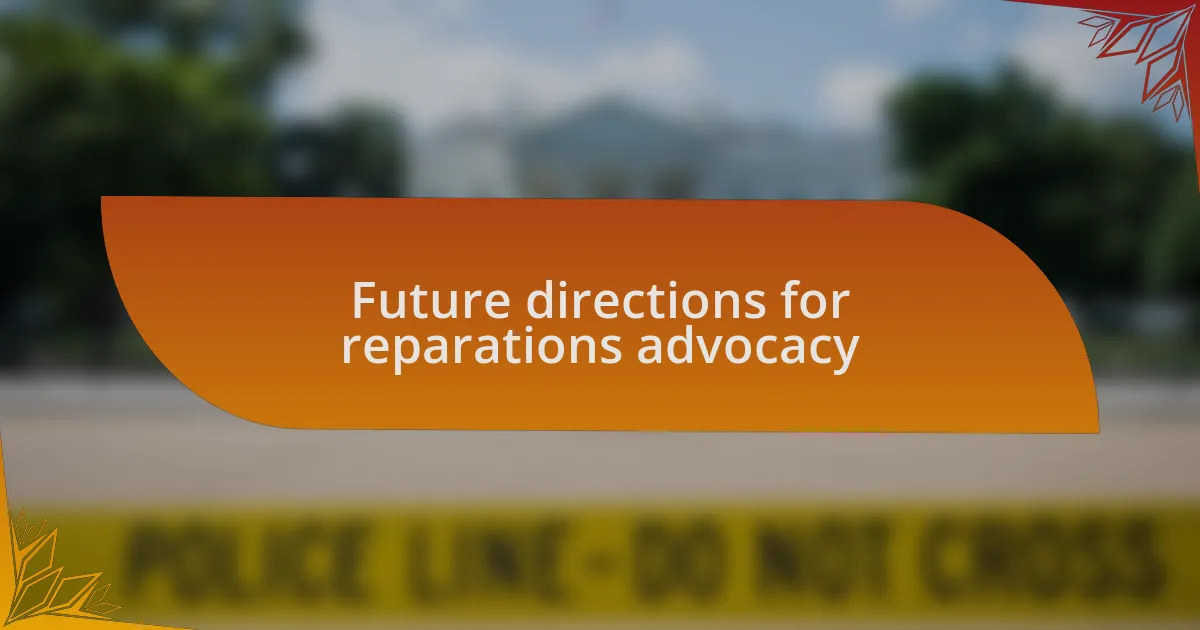
Future directions for reparations advocacy
Advocacy for reparations is shifting towards incorporating technology and digital platforms as powerful tools for outreach and education. Recently, I participated in a virtual conference where activists from around the world shared their strategies for using social media to educate and mobilize supporters. I was amazed by how a well-timed post or a viral video can turn a single story into a rallying cry for justice. Have we considered how digital activism can expand our reach and influence more effectively?
Moreover, I’ve found that engaging younger generations in these conversations is crucial for sustainable advocacy. During a community event, I saw young people take charge in discussions about reparations—challenging the status quo and introducing fresh ideas. Witnessing their passion and resolve gave me hope. How often do we involve the youth in shaping our advocacy narratives? Their perspectives can breathe new life into our movements and inspire change.
Looking ahead, I believe fostering international dialogue will play a key role in reparations advocacy. Reflecting on my time at a recent international forum, I heard representatives from various countries articulate their unique reparation journeys, each narrative resonating in its own way. It made me realize the importance of sharing these stories across borders—are we not bound together by our shared aspirations for justice? By amplifying diverse voices, we can create a more inclusive reparations movement that reflects the global demand for accountability.